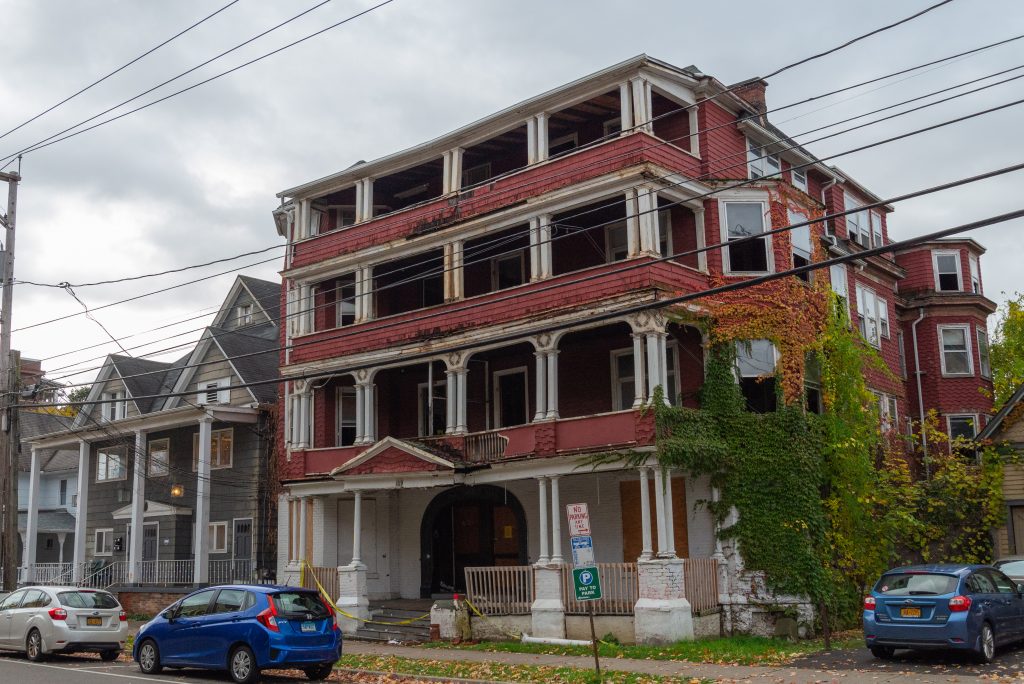Dilapidated and devalued properties across Binghamton are about to get a second lease on life.
On Oct. 18, Binghamton Mayor Richard David announced the city’s newest investment with the Broome County Land Bank. This investment involves $2 million from the American Rescue Plan Act funds that will go toward redeveloping Binghamton’s blighted properties as part of the Broome County Land Bank’s Affordable Homes Program. This is a continuation of Binghamton’s relationship with the Broome County Land Bank which has involved federal and city funding for redevelopments, dating back to the Broome County Land Bank’s creation in 2013. The current plan is to complete 12 homes in a 24-month period, with the securing of at-risk properties to come at a later date.
For David, the choice to allocate these new funds to the Broome County Land Bank was an easy one.
“When the [American Rescue Plan Act] funding came along, it was an additional opportunity to use new funds to fund our existing partnership [with the Broome County Land Bank] that is ongoing,” David said. “We have a good relationship with the [Broome County] Land Bank, we feel it is very successful. It is one of our, what I would refer to as, our ‘housing partners.’ We have a variety of nonprofit partners that we partner or team up with to deal with demolition or housing rehabilitation, so this was an obvious and natural extension for a program that we were already funding with previous government funds.”
David said his goals and hopes for this latest round of redevelopment include revitalizing and growing local neighborhoods.
“Oftentimes, dilapidated homes are the broken tooth in the smile of a street, so to speak,” David said. “These are opportunities to put these properties back on the tax rolls so they are generating taxable income while also addressing the critical housing need and shortage in our neighborhoods. The residents are the vitality, the lifeblood of the neighborhoods, so we want to put individuals and families [into homes] who are going to live in these properties long-term as a way to help stabilize and grow our neighborhoods.”
In particular, David said he hoped that beyond young professionals moving to Binghamton and making use of the housing, low- and middle-income families within the city will be able to secure their own properties thanks to the initiative.
Jessica Haas, executive director of the Broome County Land Bank Corporation, said the Broome County Land Bank’s goal to generate affordable housing for “low-income” tenants in Binghamton. Haas elaborated on the Broome County Land Bank’s intentions with the funding.
“The city’s recent announcement of $2 million in [American Rescue Plan Act] funds to support the [Broome County] Land Bank’s Affordable Homes Program will expand on the progress we have made thus far in the city of Binghamton,” Haas wrote in an email. “With this funding, the [Broome County] Land Bank will be able to provide 10 to 12 more affordable homeownership opportunities in our community.”
Haas detailed other housing initiatives, which she described as successful, between the city and the Broome County Land Bank leading up to this new partnership.
“Using active [Community Development Block Grant] funds, the Land Bank was able to rehabilitate and sell two fully renovated properties and use the sale proceeds to provide an additional affordable homeownership opportunity in mid-2020,” Haas wrote. “To build on our Affordable Homes Program, the [Broome County] Land Bank included rehabilitation deliverables in our Round 4 Community Revitalization Initiative (CRI) grant application through the [New York State] Attorney General’s Office and Enterprise Community Partners, and were awarded funds to complete the projects. Under our CRI grant, we have been able to complete four rehabilitation projects and deliver three homeownership opportunities with two more underway.”
As for the community response, Haas said she feels the Broome County Land Bank has received positive feedback from the community.
“The [Broome County] Land Bank’s Affordable Homes Program has received positive feedback from both nearby renters and property owners across our community,” Haas wrote. “Many of the properties nearby, whether they are owner-occupied or rentals, are typically well-maintained. A result of our Affordable Homes Program, although not a primary goal, rather secondary, is neighborhood stabilization which receives positive feedback from neighbors as well as the [Broome County] Land Bank’s municipal and nonprofit partners.”
Multiple students living off campus expressed a positive sentiment toward the initiative.
Matthew Kennedy, a junior majoring in Asian and Asian American Studies, said he has seen many possibilities for redevelopment in the Downtown Binghamton area.
“There’s so many abandoned properties, churches, lots, etc.,” Kennedy wrote. “We need more restaurants here, especially in areas where those [abandoned] churches/buildings are. I’m sure we could use more affordable housing. Where I live near Walnut/Main [Street] there’s about four huge church-like buildings that I’ve never seen [anyone] enter or exit. I don’t know if they are abandoned, but they might as well be. [There are also] lots of empty store spaces.”
Meanwhile, David Coyt, a senior majoring in accounting, expressed optimism about this latest push from the city.
“I think rebuilding abandoned properties in Binghamton is a great idea,” Coyt said. “There [are] a ton of financial possibilities in rebuilding Binghamton. The overall mood of residents will increase with increased attention to the infrastructure. When I walk around I see a lot of abandoned properties, as well as properties that aren’t cared for. There is a lot of potential for business, especially with the amount of college life in Binghamton.”



